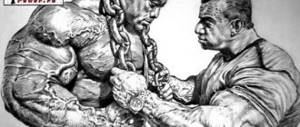Why does caffeine invigorate some people but not others?
One study in Canada took a closer look at how the human body processes caffeine. [1] Nutrition consultants and scientists from the University of Toronto conducted a study of 101 male athletes with an average age of 25 years. This group included cyclists, marathon runners, skiers, baseball players, boxers and powerlifters. Using saliva samples, the researchers were able to determine the amount and quality of caffeine that the athletes' bodies were able to process. And how did they do it? Our body contains a gene called CYP1A2. Changes in our DNA can affect how efficient this gene is at processing caffeine. Based on the results, they divided people into groups with fast and slow metabolism , and were able to prove that whether caffeine will benefit you or not depends only on your genes.
How was the study conducted?
Once a week for 3 weeks, all of these athletes came to a testing center where they received caffeine tablets or a placebo. The athletes rested for 25 minutes and then did warm-up exercises. They trained with a predetermined combination of exercises, including the so-called Wingate test. He measured superior aerobic power while riding a regular bicycle for 10 kilometers.
After 4 weeks, the researchers compared exercise performance and CYP1A2 gene test results, finding that caffeine had a positive effect on 49 of 101 athletes (fast metabolizers) and improved their performance by 6.8%. Another 44 athletes (slow metabolizers) did not experience any changes in performance, while 8 athletes with slow metabolizers experienced a nearly 14% decrease in performance , all due to the CYP1A2 gene reacting to caffeine.
Sources of caffeine
Caffeine is a powerful insecticide produced by plants to kill their enemies, pests. Just like chocolate or pomegranate, the history of caffeine dates back to our ancestors. There are several stories about its origins, including a Chinese legend in which the ancient Chinese Emperor Shennong of 3000 BC. accidentally discovered caffeine when he drank boiling water into which some coffee tree leaves had accidentally fallen.
Whether this is true or not, we can roughly guess when people learned about the properties of caffeinated drinks. The ancient Chinese philosopher Lao Tzu called this energy drink the “elixir of life” back in the 6th century BC. [2]
Coffee has a rich history that dates back to the 14th and 15th centuries in Arab cultures, where, in addition to being a big business, it was also a popular source of energy and a way to stay awake during evening prayers. Much later, in the 19th century, caffeine was first discovered in isolated form by German chemists, and shortly thereafter by their French colleagues. This is where its name “kaffee” comes from. Currently, coffee is most often obtained from the fruits of plants.
How does caffeine affect athletes' physical performance?
Caffeine acts on the central nervous system, stimulating the spinal cord, teasing muscle fibers, reducing fatigue and muscle pain . This fact was confirmed by improved physical performance in all sports. However, keep in mind that caffeine begins to take effect 30-45 minutes after consumption , so if you drink a cup of coffee immediately before training, the expected effect may not appear until later. [3]
4 Key Benefits of Caffeine for Athletes
Improved concentration and alertness
By increasing dopamine and adrenaline levels, caffeine can have a positive effect on mood and concentration. However, if you drink coffee regularly, dopamine production decreases , so your body only needs caffeine for dopamine levels to reach optimal levels. In this case, an improvement in concentration may not always be observed.
Caffeine may also reduce “working” memory even in people who do not consume caffeine regularly, likely due to its strong stimulation to the body . A study published in the Journal of Strength and Conditioning describes the fact that caffeine before exercise increases exercise intensity and improves concentration. Consuming caffeine may also improve reaction speed, which can be especially helpful in sports that require quick reactions, such as football or basketball. [4]
Increases physical and strength performance
A caffeine dose of 400 to 600 mg is one of the most reliable ways to temporarily increase strength and physical performance . People who rarely consumed caffeine tended to experience significant improvements in physical performance, especially during aerobic exercise or strength training. Caffeine may also play a positive role in post-workout regeneration. Taking caffeine along with carbohydrates can increase glycogen stores , which is very important for regeneration, especially if you exercise regularly or several times a day.
Glycogen (the body's storage form of glucose) serves as the main fuel for muscle mass, and if its supply is depleted, a person feels tired. The second “fuel” in our body is fat reserves. While the body has a sufficient amount of glycogen, working muscles are able to accumulate fat. Caffeine helps mobilize fat stores and encourages the body to use only fat for fuel. After taking caffeine before exercise, the first 15 minutes are critical for glycogen, then caffeine reduces the consumption of glycogen stores by almost 50%. Thus, muscle glycogen is only available as fuel in the later stages of training, which improves performance and prevents the rapid onset of fatigue. Thus, with the help of caffeine, the body prefers to use body fat as fuel instead of glycogen, which also leads to faster fat burning.
Caffeine also helps block certain receptors in the body that are responsible for feelings of fatigue. This allows you to do more repetitions and gives you energy and stamina during your workout. A 2012 study published in the Journal of Strength and Conditioning Research found that 180 mg of caffeine consumed 60 minutes before exercise significantly increases physical performance , which helps achieve more repetitions on the bench press, deadlift or squat. The group of people who took caffeine supplements also experienced decreased fatigue. Additionally, caffeine improved lower body strength and running performance. [5]
Stimulates fat burning
There are two main reasons why caffeine may help burn fat: a thermogenic effect (caffeine can raise body temperature in the short term) and a less pronounced lipolytic effect, meaning caffeine helps the body utilize free fatty acids as fuel. There are also several studies that point to caffeine's ability to stimulate fat burning during exercise. Caffeine stimulates the nervous system and increases adrenaline levels, signaling the body to burn fat. Although this property is not directly related to fat loss, with the help of a combination of caffeine, a balanced diet and an appropriate workout plan, caffeine will serve as a good assistant for improving your figure. [6]
Caffeine may increase the amount of calories you burn at rest for up to 3 hours after consumption. Of course, this doesn't mean you can eat everything you can get your hands on, but burning an extra 200-300 calories every day can lead to a noticeable change in your weight.
Helps reduce muscle fatigue
Whether you believe it or not, studies have proven that caffeine significantly helps reduce muscle fatigue by reducing exercise fatigue or pain during exercise. With less muscle fatigue, your performance will be better , even if you do extra sets that you wouldn't have the energy for. More reps, more effort and therefore better results! [7]
Caffeine and pre-workout stimulants
Based on the studies we mentioned above, each person reacts differently to caffeine. So it's up to you whether you want to drink a cup of coffee, take caffeine tablets, or choose a pre-workout supplement. However, caffeine is also an ingredient in some pre-workout stimulants. This is mainly because caffeine is among the powerful psychoactive stimulants that stimulate the central nervous system . It is its effect on our nervous system that can add energy, improve concentration and prevent fatigue.
Advantages
According to established tradition, we will begin the discussion of such a popular drink from the good side. Why is coffee right before a workout so beneficial? There are several useful points to highlight here:
- Caffeine is one of the main sources of magnesium, which is of great value for an athlete. Thanks to this mineral, many reactions in the body begin to occur much faster, metabolism accelerates, and the process of burning fat deposits is activated.
- The body becomes more resilient, efficiency increases, power and strength increase. These are not unfounded allegations. Many participants in the Olympic Games are well aware of all the positive features of such a wonderful drink and actively apply them in practice. Studies have shown that the component we are considering acts exclusively on the muscles, and not on the central nervous system, as many believe. On average, the “working” dose for an athlete weighing about 90-100 kilograms is 5-7 cups of coffee. But here, of course, everything is very individual. If you do not maintain the proportion, then an overdose of caffeine is quite likely. In this case, a number of side effects may appear (we will talk about them below).
- The process of muscle recovery after exercise is accelerated, and soreness is reduced. It is believed that if you take a portion of caffeine before training, you can help your muscles recover faster after grueling exercise, and also increase your pain threshold. In addition, several cups of coffee can speed up the process of glycogen resynthesis in muscle fibers and help destroy excess fat deposits. As a result, the athlete receives additional amounts of fuel for training. In turn, an overdose of caffeine has the opposite, depressing effect.
- Motivation increases and reactions become much faster. This statement can easily be confirmed by football players who often take coffee before training or an important match. Caffeine is also good because it does not increase cortisol levels.
Does caffeine have side effects?
You should never overdo anything, and this also applies to caffeine. Taking too much caffeine may cause anxiety, nervousness, high blood pressure, or nausea.
(Dehydration
Caffeine has been shown to have a slight diuretic effect on the human body, which causes a feeling of dehydration. However, this is a minor feature. Scientific research has revealed the fact that caffeinated drinks hydrate the body just as well as decaffeinated drinks. However, you should increase your fluid intake when consuming caffeine, especially when exercising in a hot, humid environment. [8]
Fatigue
While many people believe that caffeine is supposed to give you energy, high amounts can do the opposite. It was found that people who received an extremely high dose of caffeine (1000 mg/day) were more nervous, tired and stressed. However, these symptoms can also occur in people who do not drink caffeine frequently. One study tested 25 healthy men, and those who consumed more than 300 mg of caffeine per day reported that they experienced significantly more stress than men who took a placebo. However, the caffeine ratio may vary from drink to drink. For example, one large coffee ("grande") at Starbucks contains about 330 mg of caffeine. [9]
Addiction
It is common knowledge that caffeine is an addictive substance. Dependence may occur if you consume more than 200 mg per day. Various symptoms may occur throughout the day, lasting on average from 2 to 9 days and manifesting as headaches, anxiety, depression or an appetite for all the food you see. You can mitigate these side effects by reducing your caffeine dose. In relation to addiction, a study was conducted with 213 caffeine consumers who completed a questionnaire after 16 hours without caffeine. Based on survey results, it was shown that people who consume caffeine daily suffer from headaches and fatigue . [10]
Increased blood pressure and heart rate
First of all, it should be noted that these negative symptoms are individual for each person. A study on the effects of caffeine on the heart found that high doses of caffeine can cause heart palpitations. However, a study of 51 people with heart problems found no negative effects after taking 100 mg of caffeine for 5 hours. However, if you feel that caffeine is negatively affecting your body or heart , you should consider reducing your daily dose.
[eleven]
Invisible harm
But the main harm of caffeine for an athlete remains unnoticed. It accumulates and makes itself felt over time.
Pre-workout supplements are said to “deplete the nervous system.” But it is not always a question of which element contributes to exhaustion.
So, it's the caffeine.
Yes, nervous exhaustion is felt immediately after a hard workout.
But it can be restored. A day or two has passed, and the bodybuilder goes to the gym again. With a new charge of energy. By drinking an alluring drink again, or using a pre-workout.
And everything seems fine, but after 2-3 months you no longer want to train every other day. Training sessions are becoming more infrequent.
The athlete suffers from loss of motivation. But very often it’s not a matter of motivation, but a depletion of central nervous system resources. Loss of motivation is just a consequence.
Some fanatical people begin to force themselves, force themselves. They drink even more coffee, and eventually bring themselves to a weak state. Having caught all the side effects from caffeine, they leave the gym with a broken nervous system. And it will be good if in 2-4 weeks the side effects in the form of slow heart rhythm, insomnia, anxiety and other extremes from caffeine addiction go away. And after 2-3 months you will be able to resume training.
But many athletes quit the gym and do not understand that it was the addiction to coffee or tea that was the cause of these conditions. It is believed that this is physical activity in itself. They blame the gym and continue to “wash down” unfulfilled dreams with grams of caffeine per day.
What are the most popular forms of caffeine?
A cup of coffee, tea or even caffeine tablets. These are all forms of caffeine. Let's look at the most popular sources of caffeine along with their pros and cons.
Coffee
- Filter coffee: 60-180 mg per 170 ml
- Espresso: 70-80 mg per 44 ml
- Decaffeinated: 2-5 mg per 170 ml
Almost everyone loves the smell of freshly ground coffee. This form of caffeine intake should undoubtedly take first place. This is also evidenced by the fact that many athletes now prefer to drink a cup of coffee rather than a pre-workout stimulant. The biggest advantage is the fast preparation and wide selection of coffee varieties. However, do not forget that drinking too much coffee is harmful, even if it is your favorite drink.
Coffee in a can/bottle
- 70-180 mg per 220 mg
A widely available product, usually with added protein in the form of coffee-flavored milk. However, it is very important to pay attention to the nutritional value of these products, as many of them contain large doses of sugar, which will probably not please your body.
Energetic drinks
- 75-120 mg at 230 mg
Energy drinks are good pick-me-ups, but they contain too much sugar unless they are the “sugar-free” versions , which are becoming more and more available. However, you shouldn't overdo it with energy drinks either.
Tea
- 40-80 mg per 150 mg
As for the caffeine content of tea, it varies greatly depending on the type of tea. However, it is known that black tea usually contains more caffeine than green tea.
Various energy gels
- 30-100 mg per gel
Energy gels are specially formulated for endurance athletes who perform strenuous physical activities. However, not all gels necessarily contain caffeine. The main task of those gels that contain caffeine is to increase blood sugar levels in athletes. When consuming energy gels, you should drink plenty of water to better absorb the gel.
Caffeine tablets
- 100-200 mg per tablet
Caffeine tablets are one of the most effective ways to consume caffeine without having to check to see if you are actually getting the required dose without any other unnecessary substances. The downside, however, is that 1 stronger tablet may cause nervousness or other unwanted effects. Therefore, you should start with small doses so that your body gets used to caffeine.
Green tea extract
- caffeine content unknown
Although evidence indicates that green tea affects metabolism , most manufacturers do not report the exact caffeine content of this fat burner.
BCAA Energy Drinks
BCAA energy drinks have gained a lot of popularity lately, especially due to their energy drink-like taste and ability to energize and stimulate regeneration, all in one drink. One of the components of BCAA energy drinks is caffeine, which provides a long-lasting burst of energy. By the way, have you tried our new BCAA Energy drink in a can?
The benefits of caffeine for an athlete
Caffeine has several beneficial properties.
Among which:
- Short-term energy boost. Caffeine in bodybuilding is used precisely in cases where you need to get a quick boost in energy. For example, you are very tired after work and cannot energize yourself for a workout. A cup of coffee, tea or pre-workout supplement can bring you out of an energy hole;
- An opportunity to wake up. Dedicated to hypotensive patients. When your blood pressure is low, it can be difficult to lift your body from the bed. Strong coffee will help you cheer up;
- Caffeine stimulates fat burning. Athletes use it as a supplement or drink during cutting. These are scientifically proven benefits of coffee that can be tested in practice;
- Coffee improves your mood. Due to an increase in the production of happiness hormones, a general tonic effect. Moreover, after an improvement in mood there is always a decline
- Helps keep you warm. No comments here.
Frequently Asked Questions About Caffeine
Does caffeine reduce the effects of creatine?
During aerobic exercise or HIIT training, caffeine does not negatively affect the effects of creatine . On the contrary, caffeine appeared to be beneficial for overall workout performance.
Should you drink caffeine regularly?
There are some benefits associated with regular caffeine consumption, and there are also benefits from occasional use. It all depends on your preferences and caffeine tolerance.
Are energy drinks harmful?
Some studies have shown that energy drinks may have adverse effects on the cardiovascular system in particular. However, in general, if you only consume the recommended daily dose , energy drinks do not have any negative effects on the body. However, it should be noted that most energy drinks also contain large amounts of sugar. Therefore, always check the nutritional information of the drink and the ingredients, or choose the sugar-free version.
How caffeine affects our brain
During the day, you get tired because adenosine binds to what is called the A1 receptor in our brain . Caffeine prevents adenosine from binding to this receptor, helping fight fatigue.
What is a safe dose of caffeine?
A safe dose of caffeine is a very relative term because it depends on many factors, as well as your health. Some people do not experience any negative symptoms after drinking several cups of coffee a day. For others, one cup of coffee is enough to quickly increase blood pressure, improve sleep, headaches or feel nervous and tired. The safe dose of caffeine for adults is considered Pregnant or breastfeeding women should not consume more than 200 mg/day. People with cardiovascular problems should keep caffeine intake to a minimum. [12]
This figure shows how much caffeine (mg) popular drinks contain. The energy drink JOLT contains the most caffeine, at 280 mg, while a cup of ground coffee contains about 163 mg of caffeine.
What does caffeine contain?
Let us immediately note that caffeine is not only coffee. Before studying the beneficial and harmful properties of this substance, study what it contains:
Yes, tea is also a source of caffeine. Considering the love of some individuals for strong tea, many are simply not turned on by caffeine.
For example, before training, a bodybuilder drinks a cup of coffee, which, for example, contains 150 mg of caffeine.
Or he uses a pre-workout complex, the main component of which is almost always caffeine.
And then he writes on the Internet:
“This pre-workout doesn’t work! There is no result at all (or it causes drowsiness, weakness)"
If you look at a typical day for such a hero, you will notice 5-10 cups of tea drunk. Of course, with the “norm” of 500 mg per day, 150 mg before training is not felt at all.
If the nervous system is already depressed by excess caffeine, then coffee can cause drowsiness and weakness.
This is wear and tear on the nervous system. We talked about this in the material about the main harm of bodybuilding.
How many drinks do you need to drink to reach the recommended caffeine dose of 400 mg?
This figure shows how many energy drinks, coffee, black or green tea you need to drink to reach your daily caffeine intake of 400 mg .
Caffeine in bodybuilding. To drink or not to drink
According to the author, caffeine should only be used in rare cases. In 95% of situations when a bodybuilder uses this substance, the consequences are simply not worth the effect obtained.
Do you think caffeine is necessary for bodybuilding?
How does your body react to coffee or tea?
Share your experience in the comments below this post!
Share link:
- Click to share on Twitter (Opens in new window)
- Click here to share content on Facebook. (Opens in a new window)
How to consume caffeine?
To improve your athletic performance, there are several points that you should definitely know about.
Dosage
You can already feel the effects of caffeine at a dose of 20 mg (0.3 mg/kg body weight). If you have never consumed caffeine before, start with the lowest dose. Many people consume large amounts of caffeine without realizing its powerful effects on metabolism . If you drink a cup of coffee containing 100 mg of caffeine in the morning, followed by 150 mg of a fat burner (containing caffeine) and 200 mg before a workout, that amount of caffeine may cause symptoms such as tremors, anxiety, nervousness, or increased heart rate . Therefore, it is necessary to reduce the dose and adapt it to your body, physical activity or fitness. [13]











